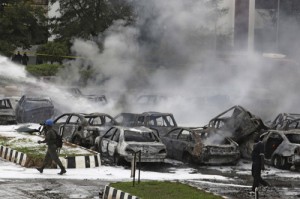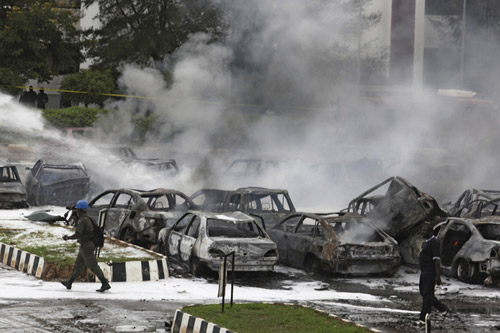
Since the bomb blast at Police Headquarters on June 16th, the Jonathan administration has been more concerned with pushing the single tenure bill and getting involved in a fiasco within the judiciary. Last friday provided another reminder of what should be important.
The suicide bomb attack on the UN building is the fourth in Abuja in the last ten months, and the situation is tragic and embarrasing in equal measure.
Insecurity in Nigeria did not start today. It is interesting that Aliyu Gusau, who has been National Security Adviser for nearly nine out of twelve years of democracy, has completely escaped scrutiny for failing to properly handle Boko Haram since they appeared on the radar in 2005. That said, Goodluck Jonathan has been in office long enough to assume ownership of the situation and must now do everything to get it under control. First off, the lack of information about the identities, capabilities, motives, tactics and targets of Boko Haram (or whoever is using their name) is startling. They are faceless. There is no picture of any key Boko Haram operative anywhere. Whenever the group is talked about in the press, the picture is one of late Muhammed Yusuf. Then we have phone calls to media houses. That is all. There is so much we do not know: Have they gotten more ambitious? Do they have outside help? If they do, to what extent? How do they get funding? WHO are the leaders of Boko Haram? These and many more questions must be answered before the attacks can be stopped. If we do not even know who the enemy is, all kinds of conjecture and conspiracy theories will take root, as is already happening. Confusion reigns because there are more questions than answers.
Those currently in charge of our nation’s security apparatus seem distinctly incapable of supplying those answers. The most crucial part of stopping terrorism is human intelligence, but instead of focusing on this, the State Security Service are more at home with arresting and watching the homes of opposition politicians. Anywhere else in the world, this level of security failure should have seen the resignations of the heads of our security agencies, yet they remain in their jobs. The President is a very loyal employer.
For as long as Nigeria cannot come to grips with this challenge, we can expect a shaping of the narrative by western media. The ‘muslim north, christian south’ analysis still exists. There is also an attempt to link Al Qaeda to Boko Haram with little or no hard evidence.
Citizens hope to take comfort in the words and actions of their leaders in trying times, and much was made of the President’s delay to address the nation. When he did speak, it was no consolation at all: ‘of course, wherever you have terrorist attack in any country, Nigeria is not an isolated case. Many countries have suffered from terrorist attack, maybe it is the turn of Nigeria. But we are on top of the situation’. In addition to the pointlessness of rotational presidency, surely Nigerians cannot be expected to put up with rotational terrorism as well.
Here’s the thing: The Federal Government cannot negotiate this one away. It cannot bribe, or give political appointments to these terrorists to pacify them. This is becoming a war, one that we are unprepared to fight. In a nation where strong institutions are non-existent in every area, this violence is merely a symptom of far greater problems.
Each year, unknown sums of money are set aside as ‘security votes’ for the use of elected officials, yet we are more insecure than ever. What is that money used for? The Northern borders are porous, hundreds of children die there each month of preventable diseases, millions more have never been to school.
At election time, politicians get jobless youths and arm them as thugs. Those politicians eventually become governors, senators and ministers, safe in their immoral immunity, while everyone else is left to contend with the Frankenstein monsters.
I think Friday, August 26 2011 could go down as a turning point. We might finally see concrete steps taken to address the growing terror threat, or it could be the moment when things get out of hand. For so many reasons, I hope it is the former.
Postscript: the Nigerian Television Authority has been a joke for a long time, but it sunk to new lows for its lack of coverage in the hours following the blast. In a world where media organizations rush to break the news, the NTA is reminiscent of the 1970s. This is what happens when government cash sustains anything: mediocrity reigns.
